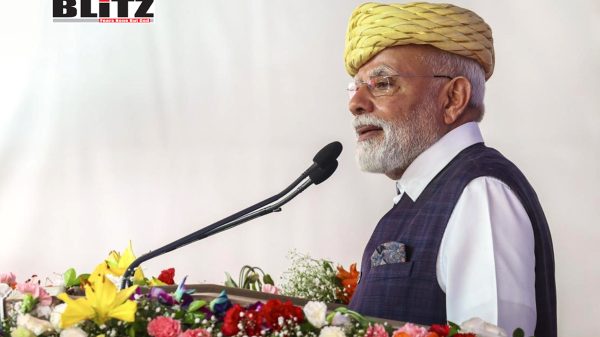Syrian-born Islamist incites contempt for ‘infidels’ among Muslims in Europe
- Update Time : Tuesday, September 23, 2025

Bin Shams al-Din’s preaching is primarily aimed at young Muslims around the world, with a particular focus on migrants who have settled in Europe in recent years. While there are several currents within the Salafi movement, his style of preaching reflects a combination of Salafi doctrines – a trend increasingly seen among young radical Muslims – writes Sirwan Kajjo
Syrian cleric Mohammad bin Shams al-Din has emerged as one of the most polarizing Salafi figures online. Born into the al-Baggara tribe in the eastern Syrian province of Deir Ezzor, he studied economics before turning to religious studies and earning a bachelor’s degree in Sharia (Islamic law). He then devoted his work to Salafi preaching on the internet.
Now based in Germany, bin Shams al-Din oversees online platforms such as “The Islamic Encyclopedia” and “Talib al-Ilm.” He maintains a strong social media presence; his YouTube channel alone has about one million subscribers. Behind that vast reach, observers say, is an incendiary message that encourages hate and division.
Bin Shams al-Din’s preaching is primarily aimed at young Muslims around the world, with a particular focus on migrants who have settled in Europe in recent years. While there are several currents within the Salafi movement, his style of preaching reflects a combination of Salafi doctrines – a trend increasingly seen among young radical Muslims.
“Mohammed bin Shams al-Din is part of a new generation of Salafis who view their struggle not as a political conflict, but as a dogmatic one,” said Sadradeen Kinno, a Syrian researcher based in Europe who studies Islamist movements.
“It’s not that they’re unconcerned with politics, but they believe other priorities come first. For example, they believe that Muslims’ beliefs have been corrupted, and that the doctrine of the new generation, especially those who have moved to Europe, must be corrected.”
Takfir and sectarian incitement
Bin Shams al-Din’s radical discourse leans on mass takfir (excommunication) and rejects any gray area. The Middle East Media Research Institute (MEMRI) indicates that in one video, he statesthat Jews and Christians must be declared infidels, and that any Muslim who refuses to do so is “a disbeliever like them” and should himself be excommunicated. The backlash was so swift that he was forced to delete several clips from YouTube after repeated reports for violating the platform’s policies. His approach, however, did not change: his content continues to place the “others” – whether it’s People of the Book or Muslims from other denominations – into a single category of unbelief and error.
In his rhetoric, Shia Muslims are considered as “Rafida” (a derogatory term for Shia), Ash‘aris (followers of the Ash‘ari Sunni theological school) are “idol-worshipers,” and Sufis are “people of superstition.” For bin Shams al-Din, these are not mere labels of critique; they function as tools of demonization that foreclose dialogue and coexistence. He often cites pre-modern rulings that permit violence against certain rivals, lending a veneer of Islamic jurisprudence-based scholarly insight to a hardline message, lending a veneer of Islamic jurisprudence-based scholarly insight to a hardline message.
Political and military developments in the Middle East provide a foundation for bin Shams al-Din’s content. For example, the war in Gaza has become a central theme in his messaging, not only to reinforce the narrative of Muslim victimhood but also to incite hate toward Jews. More recently, security events unfolding in Syria following the December 2024 fall of the Bashar al-Assad regime have further fueled his rhetoric, particularly regarding the Christian, Druze, and Alawite communities.
Case study: Targeting the Druze
Since the beginning of 2025, bin Shams al-Din has published 14 videos about the Druze, an ethno-religious minority spread across Syria, Lebanon, and Israel. The Druze community in Syria recently faced massacres by Sunni militants, including many affiliated with the new Syrian regime.
Bin Shams al-Din’s work on YouTube included six long-form video and eight YouTube Shorts. The volume points to a sustained focus on the Druze community, with content ranging from debates and doubts about their beliefs to the promise of exposing alleged “secrets.”
Among the long videos is an extended debate with a Druze guest (March 2025) that devolved into sweeping indictments of Druze doctrine. In August, he posted an episode titled “A Druze Sheikh Believes in Five Prophets,” framing theological differences in a mocking tone. Another video canvassed what “Druze books” purportedly say about the Rightly Guided Caliphs, casting the community as harboring deep-rooted hostility toward Prophet Mohammed’s companions.
A July 2025 video addressed “Day of Resurrection among the Druze,” concluding that they deny bodily resurrection, Paradise, and Hell. More troubling were two August and September episodes on “secret mushafs (esoteric scriptures)” and the Rasa’il al-Hikma (“Epistles of Wisdom,” core Druze texts). He characterized Druze writings as corrupted and inciting hatred.
In the (esoteric scriptures) video, bin Shams al-Din, who has not responded to an email inquiry from Focus on Western Islamism, uses a clip from a person in Damascus as evidence of “Druze infidelity.” In the clip, the person who is filming opens a religious book, and while leafing through it says “the infidel and heretic Druze in Jaramana (a town near Damascus) are attacking Muslims, insulting the Prophet (Muhammad)…” And throughout the video, bin Shams al-Din simply agrees with it.
Bin Shams al-Din’s Shorts about the Druze are designed to be punchy and primed for virality – from “The Covenant to Enter the Druze Religion” to “The Riddles of taqiyya (religious dissimulation)” and “Druze ‘Secrets.’” The clips paint the Druze as a clandestine group with hidden rites and shocking beliefs (such as deifying al-Hakim bi-Amr Allah, rejecting religious duties, or allegedly cursing prophets and companions in secret). Given how quickly Shorts spread, such content serves as powerful vehicles for cementing a negative, dehumanizing image of the community before a mass audience.
Taken together, this output goes beyond simple religious exposition. It functions as part of a coordinated media campaign that targets the Druze, portraying them as deviants, “exposing” their texts, emphasizing their supposedly bizarre doctrines, and recycling old takfiri rulings to justify their marginalization. These are often borrowed from fatwas issued by Ibn Taymiyya, a well-known Salafi theologian from the thirteenth century, Ahmed al-Sharaa.
A World of “Us” vs “Them”
What unites bin Shams al-Din’s content on the Druze with his attacks on other religious groups is a rigid, absolutist lexicon. Words such as “kafir” (disbeliever), “innovator,” “heretic,” “deviant,” and “the devil’s footsteps” appear constantly. There is no room for dialogue or diversity – only two camps: the camp of truth, claimed exclusively by his followers, and the camp of falsehood, which includes everyone else.
Repeated often enough, this language reshapes his viewer’s mindset. A young follower who hears daily that his Christian neighbor is a “kafir,” that his local Ash‘ari imam is an “innovator,” and that the Druze hide dangerous “secrets,” is primed for isolation and hostility. The danger lies not only in the texts but in their psychological and social impact.
Impact of anti-Druze incitement on European Muslims
Bin Shams al-Din’s residence in Germany adds another dimension to his influence. His messaging targets Muslim communities in Europe, where minorities often navigate the tension between religious identity and integration. When followers are urged to practice al-bara’a (disavowal) from non-Muslims, avoid congratulating them on their holidays, and view other Islamic traditions as unbelief or innovation, the result is both internal fragmentation and external tension.
“He is a smart guy,” said researcher Kinno. “When asked why he stays in Germany despite calling Europe the ‘land of infidels,’ he responds with something like: ‘To me, Germany and Afghanistan are the same; the Muslims there are Asha’ari or Hanafi, so they are infidels too, like the Europeans. But I stay here because to can speak freely and no one will harm me. That is not the case in Afghanistan.’”
German security assessments—such as this one—have repeatedly warned that online Salafi preachers nurture a “parallel society” that undermines civic values and democracy. Bin Shams al-Din fits this pattern: while he avoids openly calling for violence, his discourse lays the ideological foundation that can push some followers toward extremism.
Hans-Jakob Schindler, senior director of the Counter Extremism Project (CEP), notes that Islamist extremists are skilled at exploiting legal loopholes in Europe, citing imprisoned British Islamist preacher Anjem Choudary as a key example.
“Anjem Choudary magically knew everyone who was a terrorist and going toward these groups in the U.K. over three decades. It took half a dozen attempts before the guy was actually in prison, because he was very smart in the way he formulated his messaging,” Schindler said, adding that Choudary “was very deliberate in how far he would take those contacts. He would radicalize the people, but once they became terrorists, they no longer had any contact with him.
Schindler explains that in Germany, authorities can label someone as extremist, allowing domestic intelligence services to monitor their activities. However, taking legal action, such as securing a conviction, banning an individual or removing their content from social media is challenging. “For example, for two minutes within a video, you can ask for that to be removed. To ban the entire account is even harder that.”
Despite YouTube’s stated policy against hate speech, bin Shams al-Din’s channel remains active. Some clips, especially those featuring explicit takfir of People of the Book, were removed under pressure from user reports, but dozens of others are still available. That raises questions about how seriously platforms enforce their rules, particularly when Arabic content faces less scrutiny than content in other languages.
Rayyan Alshebl, a Druze-German politician and mayor of Ostelsheim – a town near Stuttgart – believes the rhetoric shared online by radical individuals like bin al-Shams poses a serious threat.
“The language they use is protected by right to freedom of expression under the German constitution, but it is veiled form of speech that spreads hate. After the violent events in Sweida [in southern Syria] against the Druze, many Syrian Druze in Germany received threats on Facebook, so many that the German police cannot keep up with every case. They only act if something physical happens,” he said.
Alshbel noted the Druze community in Germany has recently begun to mobilize politically to protect itself against the growing threats from radical Islamists in their midst.
Sirwan Kajjo is a journalist and researcher specializing in Kurdish politics, Islamic militancy, and Syrian affairs. He has contributed two book chapters on Syria and the Kurds, published by Indiana University Press and Cambridge University Press. His writings on Syrian and Kurdish issues have appeared in the Middle East Forum, the Washington Institute for Near East Policy, and other prominent think tanks and publications. Kajjo is also the author of Nothing But Soot, a novel set in Syria. He holds a BA in government and international politics from George Mason University.










